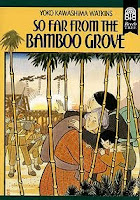 "I competed with life and death when young. And I won." Yoko Kawashima Watkins
"I competed with life and death when young. And I won." Yoko Kawashima WatkinsAs a reader, it is often hard to find contrasting books about such controversial and shocking topics. I was pleasantly surprised to find that this author didn't attempt to make one race appear better than the other in the telling of her early life story.
There were so many instances where this book paralleled with Year of Impossible Goodbyes. The Kawashima family struggled like Sookan's to find food, a safe place to live, and a way to escape to the 38th Parallel. Even though their situations were completely different--the high ranking Japanese family found themselves eating out of trash cans, stealing uniforms from dead Korean soldiers, and struggling to find freedom past the 38th Parallel.
I was surprised early on in the book the way Yoko was so impulsive and unafraid to last out at those doing wrong to her--from biting a Japanese policeman attempting to steal their remaining possessions, to standing up to the horrible girls in her classroom by befriending the janitor and getting straight As on her reportcard. There is a strong sense of survival in this small girl that seems to grow as the book goes on.
I can understand her crying and fussing during their travel on the railroad and beyond because she had been badly injured (she had to stay at a hospital for awhile to recover). She was young and scared and I thought it was harsh of her mother and sister to chastise her.
"Why can't you be strong and good like your honorable sister?"
Yoko yelled, "I'm not her! She'd cry too if she'd got hit."
Ko responded, "You have done nothing but whine and fuss. This journey would be easier if you had got killed."
Whoa. That is over the line and Ko knew it--she spent the rest of her time attempting to right this wrong. How does one do that? Such a statement is so strong and hurtful it can only be undone by ceaseless acts of love. Ko was a hard worker for the two and attempted to carry the burden of providing for her family.
Even though Yoko's family was of the "Superior" race, they struggled to survive and felt no special treatment--often the opposite due to the father's role in the Japanese regime. I liked this book the best of the two and felt a connection with the characters' love for family and incessant need to be reconnected. I can't imagine going through half of what these young girls did and hope to never have to. This is a truly remarkable account of a confusing and often forgotten part of history.

No comments:
Post a Comment